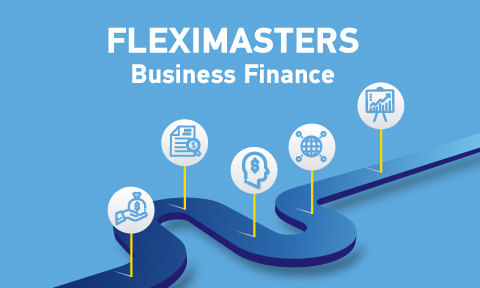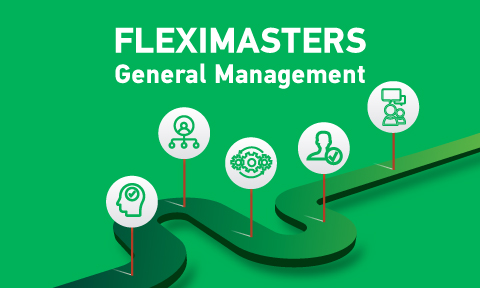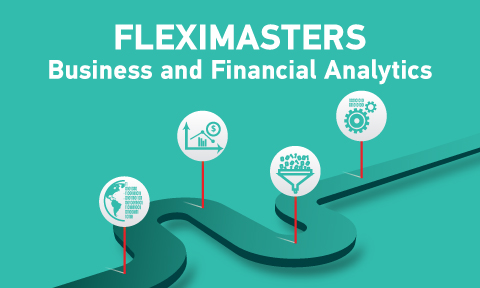Introduction
FlexiMasters in Business and Financial Analytics equips participants to excel in the domain of business analytics and analytics used in the financial services industry.
Participants will learn skills necessary to guide businesses through today’s environment of digital disruption and transformation.
FlexiMasters in Business and Financial Analytics is offered at Nanyang Business School as part of the FlexiMasters series launched by Nanyang Technological University, Singapore (NTU Singapore).
- Provide learners with better access to Postgraduate level training so that they can upskill/reskill with a personalised learning pathway.
- Enable adult learners to build on their experience, transit and prepare for career shifts and become future-ready amidst fast-changing employment market.
- Credits earned can be stacked towards postgraduate degrees at NBS.
| Module | Objective |
|---|---|
AI and Analytics Technologies in Enterprise | Analytics, machine learning and AI are critical building blocks in value creation for any organization or industry yet managing them is a complex endeavor. This presents huge opportunities to harness the power of analytics and machine
learning, to explore and exploit business problem and turn it into solution. This course introduces the concept of analytics with machine learning and how can business embed and embrace them in its operation. Participants will learn about the current state of the art of machine learning development and learn to start creating an Artificial Intelligence prototype and appreciate how the artificial “intelligence” is derived from human intelligence. Learning Outcome 1. Understand the basic of analytics and machine learning and how they are relevant to business. 2. Understand the elements of machine learning and the steps in developing machine learning capability. 3. Construct machine learning solution for a given problem. 4. Manage the use of analytics and machine learning to support business decision. |
AI and Analytics in Finance, Credit and Related Risks | Coding expands students’ digital literacy horizon. Analytical thinking puts together critical thinking and reasoning skill. AI will allow participants to create state-of-the-art predictive and prescriptive technology which will eventually
automate the process of Accounting and Finance. Increasingly, employers today mandate employees to be equipped with these skillsets to help to resolve organizations’ issues, automate business and accounting processes, data crunching,
report generation and giving financial advice. Similarly, credit-related risk is an essential area of business and finance, which leverages on the application of machine learning and data mining tools to large customer databases. This course provides fundamental tools for credit risk modeling and evaluation by data analytic techniques. Learning Outcome 1. Write code to solve Accounting and Finance problems programmatically by creating AI models using R, Python, Keras, Hadoop, Spark and API. 2. Manage data to sufficiently derive, communicate analytics outcome and eventually create AI model in Accounting and Finance. 3. Implement a simple system in AWS including engineering work in implementing AI model in Accounting and Finance. 4. Equip with data modeling skills for risky events. 5. Gain an in-depth understanding of credit risk modeling concepts. 6. Introduction to relevant data mining techniques. 7.Learn to use analytics tools for credit risk and credit scoring applications. |
Data Management and Visualization | Data has become integral to businesses and organizations. This course is built to bridge the gap between market talent demand and talent availability specific to business data management and business visualization. The course serves dual roles of presenting the importance of data on business decision making and of demonstrating ways that visualization can effectively augment business decisions. Learning Outcome 1. Equip with skills in solving data-related problems and designing visualization to augment business decision making. 2. Equip with a strong conceptual and technical knowledge in database designing and implementation and developing visualization relevant to business. 3. Understand how database support business processes and gather information for business analytics. 4. Apply knowledge and skills to analyze a variety of business process, identify data requirements, and create corresponding visualization strategies. |
Design Thinking, Blockchain Technology Management and Cybersecurity | Design thinking has become increasingly popular in the world of business, with small & medium to large firms like P&G and SAP using and advocating the Design Thinking approach. Design thinking, emphasizing Human-Centered Design and empathy driven solutions, has been promoted widely by design firms like IDEO and Stanford University’s D School. It has now become a must-know tool for companies who are keen to grow and flourish through continuous innovation. The course will introduce participants to the key principles of design thinking, utilizing relevant case studies. It is also crucial for participants to appreciate the core technical aspects of blockchain, especially when it promises to disrupt the current business landscape through consensus-driven decentralization of the traditional computing fabric. Concepts of blockchain will be discussed, examining the blockchain using cases and challenges related to its implementation. With the proliferation of information and communication technology products and services, it is of paramount importance for everyone to understand the role of security and privacy in practice. Financial technology, data analytics and digital transformation of businesses have immensely amplified the value of data, thereby demanding the appreciation of cybersecurity threats and privacy issues, in every sphere of business. Learning Outcome 1. Understand the key innovation skills necessary for leading firms. 2. Apply fundamental concepts and principles of design thinking to the analytics domain. 3. Identify business opportunities in the AI and analytics domain. 4. Generate business models to commercialize business opportunities in the AI and analytics domain. 5. Understand challenges associated with commercializing AI technologies. 6. Introduction to the evolving blockchain ecosystem. 7. Understand the underlying technological elements and workings of blockchain, use cases of blockchain, and challenges with using blockchain. 8. Understand the possible use-cases of blockchain. 9. Acquaint with the cybersecurity risks in the business sphere. 10. Understand the security and privacy mechanisms that can protect invaluable data in storage, transit, access and usage. |
Standard Course Fee: S$$18,750 (Before GST)
| Course Fees in SGD | ||
|---|---|---|
| Fees BEFORE funding & GST | Fees AFTER funding & 9% GST | |
| Singapore Citizens (aged 21-39) / PR (aged ≥21) 70% Funding | $18,750.00 | $6,131.25 |
| Singapore Citizens (aged ≥40) MCES1 - up to 90% | $18,750.00 | $2,381.25 |
| SME-sponsored Singapore Citizens / PR ETSS2 - up to 90% | $18,750.00 | $2,381.25 |
| NTU Alumni Fee payable after 70% SSG Funding and use of $1,600 **NTU Alumni Course Credits | $18,750.00 | $5,608.05 |
1. Under the SkillsFuture Mid-career Enhanced Subsidy (MCES) scheme. For more information, visit the SkillsFuture website here.
2. Under
the Enhanced Training Support for Small & Medium Enterprises (ETSS) scheme. For more information, click here.
Singapore Citizens, aged 25 and above, and self-sponsored, may use their SkillsFuture Credit to defray part of the net course fee. Participants can submit their SkillsFuture Credit claims by logging into MySkillsFuture.sg. Please click here for “How do I submit a claim for SkillsFuture credit?” and other FAQs.
Funding Requirements
- Participant must achieve a minimum of 75% attendance for each module.
- Participant
must complete and pass all assessment components.
Participants will be invoiced the net amount after funding and GST.
**NTU Alumni Course Credits
All self-sponsored NTU/NIE alumni may utilise their alumni credits of $1,600 to co-pay up to 50% of the nett fee (exclusive of prevailing GST) payable for courses offered by NTU-Continuing Education Training (CET) Units. It is participant’s responsibility
to inform if you wish to utilize alumni credits before the start of the programme. For more info, please click here.
 | FlexiMasters in Business Finance The FlexiMasters in Business Finance is suitable for participants interested in finance but who had a minimal exposure to this field at the tertiary level. A sequence of five graduate courses will give participants a broad exposure to financial topics including financial management (corporate finance), Investments, and newer topics such as fintech and sustainable finance. |
 | FlexiMasters in Marketing in a Digital World The FlexiMasters in Marketing in a Digital World is designed to help marketers succeed in this digital age. The program will equip you with the fundamental marketing knowledge and important analytic and digital marketing skills to meet industry demands in this age of complexity. |
 | FlexiMasters in General Management This program aims at equipping participants with skills necessary to run modern enterprises. The five-course sequence will focus on key aspects of business strategy, people management, operations, company governance, cultural intelligence and business negotiation. |














/enri-thumbnails/careeropportunities1f0caf1c-a12d-479c-be7c-3c04e085c617.tmb-mega-menu.jpg?Culture=en&sfvrsn=d7261e3b_1)

/cradle-thumbnails/research-capabilities1516d0ba63aa44f0b4ee77a8c05263b2.tmb-mega-menu.jpg?Culture=en&sfvrsn=1bc94f8_1)

7e6fdc03-9018-4d08-9a98-8a21acbc37ba.tmb-mega-menu.jpg?Culture=en&sfvrsn=7deaf618_1)




.png?sfvrsn=25651bb_0)

